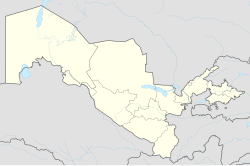|
Uchquduq
Uchquduq (sometimes spelled as Uchkuduk, Uzbek: Üçquduq; Russian: Учкуду́к) is a city in the north of Navoiy Region, Uzbekistan. It is the seat of Uchquduq District.[1] The city's name means "three draw-wells" in Uzbek. It is located at 42°9′24″N 63°33′20″E / 42.15667°N 63.55556°E, at an altitude of 193 meters in the middle of the Kyzylkum Desert .[2] Its population is 26,800 (2016).[3] HistoryUchquduq was founded in 1958, after a small prospecting party found deposits of uranium ore. In the late 1960s, the development of open pit and underground mining led to the rapid growth of the settlement, with workers, engineers and technicians from all over the Soviet Union. It was elevated to city status in 1978. Until 1979, Uchquduq had the status of a "closed secret city," as it supplied much of the raw material for nuclear weapons in the Soviet military arsenal. The mining operations are now under the control of the Navoi Mining and Metallurgy Combinat (NMMC), which continues to mine and process uranium using in-situ leach processes. The company also produces gold by the same process.[4] Aeroflot Flight 5143 crashed near Uchquduq on July 10, 1985; this was the deadliest air disaster in the Soviet Union.[5] The Uzbek group Yalla made a Soviet-wide hit named after the city.[6] References
Wikimedia Commons has media related to Uchkuduk.
|
||||||||||||||||||||







